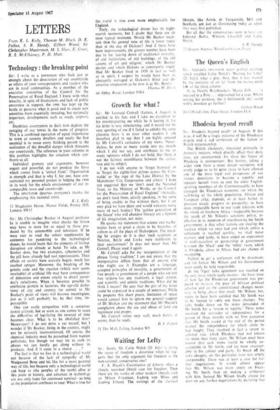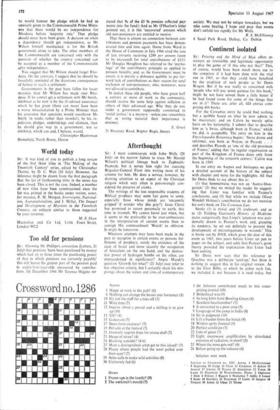Rhodesia beyond recall
Sir: Rhodesia beyond recall! (4 August). If this is so, it will be a tragic outcome of the Rhodesian dispute and a sad confession of the failure- of British statesmanship.
The British electorate, interested primarily in domestic matters, which directly affect their daily lives, are unconcerned; for them the future of Rhodesia is unimportant. But history, taking a wider view from a more distant viewpoint, will surely judge us to be quite crazy to have allowed one of the most loyal and prosperous of our former dominions to become a republic and separate herself from us and the other English- speaking members of the Commonwealth; to have damaged the Rhodesian economy, on which the well-being of the whole population, African and European alike, depends, or at least halted its previous steady progress to prosperity; to have done irreparable harm to our trade relations with the whole of Southern Africa—irreparable because the result of Mr Wilson's sanctions policy, in- effective in its intention of overthrowing the Smith government, is that other nations are stealing the markets which we once had and which, unless a settlement is reached quickly, we shall never recover; and lastly, to have ended an experiment
multi-racialism or partnership in government brtween the 'black' and the 'white' races, which in Rhodesia, alone in Africa, had any chance of succeeding.
Failure to get a settlement will be disastrous: and for failure Mr Wilson and his Government must surely be held responsible.
At the 'Tiger' talks agreement was reached on the only issue which really matters-- the basic issue of how far the Rhodesian government was pre- paled to increase the pace of African political advance and on the constitutional changes neces- sary to bring about that result. Mr Wilson, too, seems to have been satisfied that Mr Smith was to be trusted to carry out those changes. The talks broke down on the terms demanded of Mr Smith for a 'return to legality.' These terms inxolved the surrender of independence for a period of three months with no firm guarantee that Mr Smith would at the end of the period recover the independence for which alone he had fought They involved in fact a return to colonial rule, which Rhodesia had not known for more than forty years. Mr Wilson must have known that such terms would be wholly un- acceptable to Mr Smith, and far more unaccept- able to his cabinet and party. To break off the talks abruptly on this particular issue was utterly irresponsible. There was at least a case for fur- ther negotiations. It would almost appear that Mr. Wilson was more intent on break- ing Mr Smith than on making a settlement with him. Instead Mr Wilson finally closed the door on any further negotiations by declaring that he would honour the pledge which he had so unwisely given to the Commonwealth Prime Minis- ters that there would be no independence for Rhodesia before 'majority rule.' That pledge should never have been given. A decision on when a dependency should get independence, as Mr Wilson himself maintained, is for the British government alone to take. The other members of the Commonwealth are concerned only with the question of whether the country concerned can be accepted as a member of the Commonwealth after independence.
You suggest that Mr Wilson should forget Rho- desia. On the contrary. I suggest that he should be forcefully reminded of the disastrous consequences of failure to reach a settlement.
Governments in the past have fallen for lesser mistakes than Mr Wilson has made over Rho- desia. If he cannot get a settlement with Mr Smith, inhibited as he now is by the ill-advised assurances which he has given (there can never have been a worse miscalculation by a Prime Minister than his assurance that sanctions would overthrow Mr Smith 'in weeks rather than months'), by his in- judicious pledges, undertakings and ultimata, then he should give way to a government, not so inhibited, which can and, I believe, would.































 Previous page
Previous page